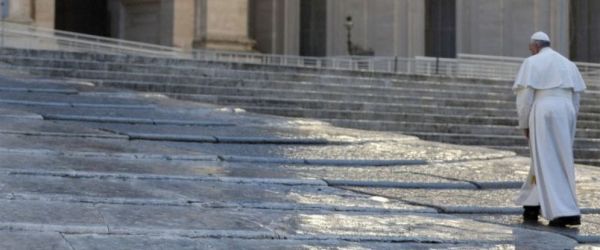The Solemnity of All Saints is “our” celebration: not because we are good, but because the sanctity of God has touched our life. The Saints are not perfect models, but people through whom God has passed. We can compare them to the Church windows which allow light to enter in different shades of colour. The saints are our brothers and sisters who have welcomed the light of God in their heart and have passed it on to the world, each according to his or her own “hue”. But they were all transparent; they fought to remove the stains and the darkness of sin, so as to enable the gentle light of God to pass through. This is life’s purpose: to enable God’s light to pass through; it is the purpose of our life too.
Indeed, today in the Gospel, Jesus addresses his followers, all of us, telling us we are “Blessed” (Mt 5:3). It is the word with which he begins his sermon, which is the “Gospel”, Good News, because it is the path of happiness. Those who are with Jesus are blessed; they are happy. Happiness is not in having something or in becoming someone, no. True happiness is being with the Lord and living for love. Do you believe this? True happiness is not in having something or in becoming someone; true happiness is being with the Lord and living for love. Do you believe this? We must go forth, believing in this. So, the ingredients for a happy life are called Beatitudes: blessed are the simple, the humble who make room for God, who are able to weep for others and for their own mistakes, who remain meek, fight for justice, are merciful to all, safeguard purity of heart, always work for peace and abide in joy, do not hate and, even when suffering, respond to evil with good.
These are the Beatitudes. They do not require conspicuous gestures; they are not for supermen, but for those who live the trials and toils of every day, for us. This is how the saints are: like everyone, they breathe air polluted by the evil there is in the world, but on the journey they never lose sight of Jesus’ roadmap, that indicated in the Beatitudes, which is like the map of Christian life.
Today is the celebration of those who have reached the destination indicated by this map: not only the saints on the calendar, but many brothers and sisters “next door”, whom we may have met and known. Today is a family celebration, of many simple, hidden people who in reality help God to move the world forward. And there are so many of them today! There are so many of them! Thanks to these unknown brothers and sisters who help God to move the world forward, who live among us; let us salute them all with a nice round of applause!
First of all — the first Beatitude says — they are “poor in spirit” (Mt 5:3). What does this mean? That they do not live for success, power and money; they know that those who set aside treasure for themselves are not rich toward God (cf. Lk 12:21). Rather, they believe that the Lord is life’s treasure, and love for neighbour the only true source of gain. At times we are dissatisfied due to something we lack, or worried if we are not considered as we would like; let us remember that our Beatitude is not here but in the Lord and in love: only with him, only by loving do we live as blessed.
Lastly I would like to quote another beatitude, which is not found in the Gospel but at the end of the Bible, and it speaks of the end of life: “Blessed are the dead who die in the Lord” (Rev 14:13). Tomorrow we will be called to accompany with prayer our deceased, so they may be forever joyful in the Lord. Let us remember our loved ones with gratitude and let us pray for them. May the Mother of God, Queen of the Saints and Gate of Heaven, intercede for our journey of holiness and for our loved ones who have gone before us and who have already departed for the heavenly Homeland.
[Pope Francis, Angelus 1 November 2017]












